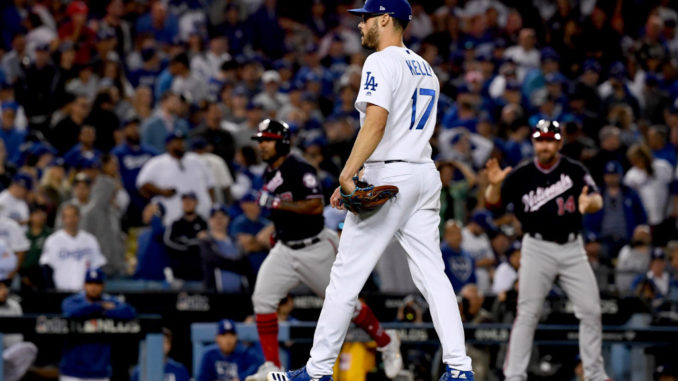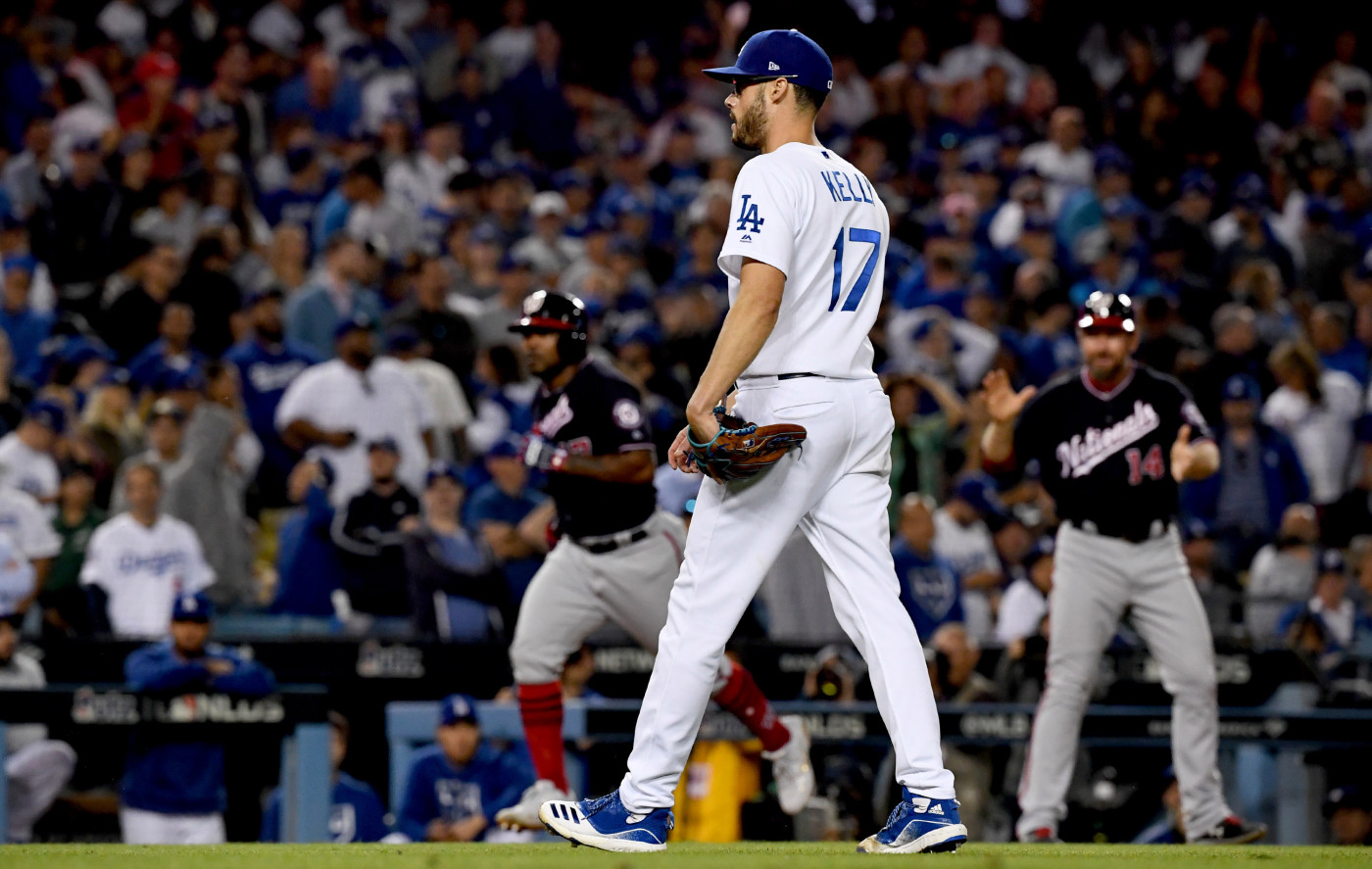
Editor’s note: This is the Friday, Oct. 11 edition of the Inside the Dodgers newsletter. To receive the newsletter in your inbox, sign up here.
In Thursday’s newsletter, I played the “blame game” as it concerned Dave Roberts and Andrew Friedman in Game 5 of the National League Division Series. It took 1,633 words, but we got there. The loser, of course, was the 2019 Los Angeles Dodgers. The winner was you – the fan who took time to write back.
Today, I’ll turn to the players. Twenty-five men took the field at various points in the series against the Nationals, and some deserve a closer look than others. The guiding question is, what was each player asked to do in the Division Series, and did he do it? This is a long read, so buckle up. You’re about to find out why so many people are quick to blame the manager and general manager of a losing team: it’s easier.
I’m ranking the players by their Championship Win Probability Added (cWPA), an estimator for how valuable each player was to bringing the Dodgers closer to ending their 31-year World Series drought. (You can find an explanation of the stat here.) We’ll start with the most valuable player and work our way down to the least. No peeking!
1. Walker Buehler (.079 cWPA)
The decision to start Buehler in Games 1 and 5 was, I think, mildly controversial. Clayton Kershaw had been the Dodgers’ designated “Game 1 starter” throughout the decade. Hyun-Jin Ryu was the team’s best pitcher at home this year, at least by ERA. Buehler, 25, thumbed his nose in the face of inexperience and the death of his aunt in the middle of the series, and pitched better than anyone on either team – better than Kershaw, better than Ryu, better than Stephen Strasburg, Max Scherzer and Patrick Corbin. In Game 5, he did some “big boy stuff.”
When imagining what might have been if the Dodgers advanced to the NLCS, I start with Buehler. This could have been his 2003 Josh Beckett/1985 Ron Darling/1949 Don Newcombe month. Choose the “breakout October pitcher” that best suits your generation; that could have been Buehler. His tears stung more than the champagne in the other clubhouse Wednesday.
2. Kiké Hernandez (.049 cWPA)
Hernandez only got into three of the five games, taking seven plate appearances. But his twisting catch in the second inning of Game 5 helped preserve the Dodgers’ 2-0 lead, and his home run in the bottom of the second inning extended it to 3-0. His pinch hit double in the sixth inning of Game 3 extended the Dodgers’ two-out rally against Patrick Corbin. Hernandez has been a productive contributor in the Dodgers’ four consecutive NLDS appearances. Count it as further evidence that he can be a valuable role player in the clutch.
3. Kenta Maeda (.049 cWPA)
Maeda was the Dodgers’ best reliever in the series, continuing his streak of solid postseason relief work. He succeeded with two pitches, an average fastball setting up a devastating slider. Maybe someday he’ll be able to unleash his changeup against a lefty in October.
4. Max Muncy (.048 cWPA)
The expectations were higher on Cody Bellinger and Corey Seager, and perhaps Justin Turner, but Muncy proved to be the clutch hitter the Dodgers needed in the middle of their lineup. He had five hits and seven RBIs. He had twice as many walks (4) as strikeouts (2). He was a thorn in the side of lefties (Patrick Corbin, Sean Doolittle) and righties (Stephen Strasburg, Anibal Sanchez) alike. His 0-for-4 effort in Game 4 was his only unexcused absence in the series. Muncy didn’t do much in last year’s playoffs, and it’s possible he is simply a better hitter now than he was a year ago. It’s also possible that this was small-sample luck at its finest, or that he is best left in the lineup everyday, rather than platooned against lefties. In any case, I suspect he would have been fun to watch against the Cardinals, too.
5. Justin Turner (.042 cWPA)
Since the postseason expanded in 1995, a total of 197 players have batted 50 times in the Division Series round. Turner’s 1.152 OPS ranks seventh. His five RBIs (on six hits) in this series ranked second to Muncy. His three-run home run against Wander Suero put Game 3 out of reach. His glovework at third base, while not golden, was no worse than silver. Turner’s performance amounted to a pointed rebuttal about his myriad injuries in September leaving him “rusty.”
6. Russell Martin (.032 cWPA)
Knowing the Dodgers planned to pair him with Hyun-Jin Ryu, did Martin’s bat impact the decision to start Buehler in Games 1 and 5? Far from a liability, Martin’s bat provided the most impactful hit of any Dodger in the series – a double against Corbin to spark the Game 3 rally. Martin also hit a home run in his only game of the series. If it was the final game of his career – a distinct possibility – the 36-year-old veteran made it count.
7. Julio Urías (.009 cWPA)
Big dropoff here. Urías was the losing pitcher in Game 4. He faced five batters, got two outs, and bequeathed a first-and-third, two-out situation to Pedro Baez. You might remember what happened next. Urías also fired three scoreless innings across two more appearances in the series. He did more good than harm overall, and there’s a solid case to be made that Urías should have figured into the relief succession after Buehler exited Game 5.
8. Adam Kolarek (.008 cWPA)
This is telling: Kolarek was responsible for three of the 135 outs in the series, and that made him the fourth-most valuable Dodger pitcher in this series. Along with Buehler, Muncy, and Maeda, I would have been fascinated to see Kolarek try to extend his mastery of the moment for another couple weeks, but alas. He’ll always have Juan Soto.
9. Joc Pederson (.004 cWPA)
Pederson got into all five NLDS games, finishing 4 for 15 with a solo home run (against Hunter Strickland late in Game 1) that accounted for his only RBI in the series. He almost homered to begin Game 5, which for a couple hours looked like it might be his critical hit in the series. Ultimately Pederson was neither an obvious asset nor a liability. Against a team with so many right-handed pitchers, it’s reasonable to have expected more.
10. Kenley Jansen (.002 cWPA)
If you told me Jansen would face only five hitters in the series, and gave me five guesses why, I would have gone:
1. Jansen faced five batters in Game 1, all of them reached base, and he wasn’t allowed out of the bullpen again2. All three games were blowout wins3. All three games were blowout losses4. Recurrence of heart problems5. Caught using a foreign substance, was banned after facing five batters
The correct answer? Jansen faced three batters in a non-save situation in Game 3, then faced two batters in a non-save situation in Game 5. To his credit, Jansen retired all five batters, but that’s not what anyone will remember about his performance in this series. If the Dodgers were still playing right now, we would be asking why Roberts asked so little of his closer. Now that the Dodgers have been eliminated it’s arguably an even more important question – not because Jansen’s eight blown saves in the regular season weren’t a sufficient reason, but because Roberts never once indicated someone other than Jansen would be in the mound in close ninth-inning situations.
11. Hyun-Jin Ryu (-.001 cWPA)
Ryu pitched well enough to win his only start, in Game 3 in Nationals Park. The Dodgers didn’t make that win official until Anibal Sanchez, the Nationals’ starter, was out of the game. Because Sanchez out-pitched Ryu during their five innings on the mound, Ryu doesn’t rate highly in cWPA. Forcing the veteran left-hander to make his only start on the road did not put him in the best position to be his best self. This was hardly Roberts’ biggest mistake in the series, if starting Ryu on the road can be called a mistake at all.
12. Ross Stripling (-.002 cWPA)
Stripling faced four batters in the series. All came in the sixth inning of Game 3, against the top of the Nationals’ batting order, with the Dodgers trailing 5-1. This is probably the last thing you will remember about the 2019 National League Division Series.
13. Dustin May (-.004 cWPA)
May made two appearances in the series. The eighth inning of Game 2 didn’t go well; he allowed a run on a double, a walk, and a single against the bottom of the Washington lineup. If the Nationals had not handed May two outs in the inning, it easily could have been worse. The rookie right-hander rebounded to throw two scoreless innings late in Game 4, which mostly served to rule him out of pitching late in Game 5. In hindsight, May’s potential as a late-inning stopper might have been wasted. Conversely, May could have done more in Game 2 to earn a look in a higher-leverage situation later on in the series.
14. Rich Hill (-.006 cWPA)
Hill started Game 4 and gave the Dodgers 2 2/3 innings while allowing one run. That’s more or less along the lines of “met expectations.” But how anticlimactic! For a 39-year-old journeyman in the final year of his contract, who presumably would have had a longer leash on the mound if the Dodgers advanced to the NLCS, you really feel for the guy. What a waste of a potentially fantastic storyline. Speaking of which …
15. David Freese (-.010 cWPA)
Ugh. Where do we begin? Freese went 0 for 3 in his only start of the series, against the lefty Corbin in Game 1. Freese went 4 for 5 with a double off the bench, the lone one out serving as the one you’re most likely to remember – a strikeout against Corbin in the bottom of the eighth inning of Game 5. Considering Freese was among the best pinch hitters in the game this season, with even better numbers against righties than lefties, he was miscast worse than Vince Vaughn in True Detective. If this performance merely earned Freese another contract with the Dodgers, maybe it wasn’t all for naught.
16. Matt Beaty (-.010 cWPA)
Beaty went 3 for 8 with three singles in the series, which also feels in line with “met expectations.” His cWPA suffers because 1, he made a couple outs with runners in scoring position and 2, his leadoff single late in Game 2 didn’t materially alter the outcome of an eventual Dodger loss. In the context of his rookie season, I think this series was ultimately a step forward for Beaty. He’s limited defensively, and ineffective against left-handed pitching, but he doesn’t waste at-bats and seems to be the same player regardless of the moment. That’s rare.
17. Gavin Lux (-.017 cWPA)
Lux homered into a trash can to begin his first-ever postseason. From that point on, he went 1 for 8 with six strikeouts. Woof. That’s the kind of batting line, even more than Beaty’s, that makes you wonder what a healthy Alex Verdugo could have done in this series – the one injury-related “what if” that carries the potential to linger into the winter.
If there’s an early concern about what Lux did in 2019, it’s that he saves his best for first. In the hours before his September debut, the 21-year-old said he’s always been driven “to impress people, (to) show people you can play” after being promoted to the next level. Lux homered in his big league debut. He homered in his playoff debut. Each time, his performance petered out after Game 1. That pattern can’t continue if Lux intends to be the Dodgers’ second baseman (or shortstop) of the future.
18. Cody Bellinger (-.021 cWPA)
Talk about feast or famine. Bellinger started slowly, picked up four hits in the final three games, but ultimately finished the postseason with zero runs batted in. Zero. That’s probably the stat of the series – ahead of Clayton Kershaw’s ERA, Kenley Jansen’s total innings pitched, A.J. Pollock’s strikeouts, all of it.
Highlighting RBIs is at least a little unfair to Bellinger. He played excellent defense in the five games. He stole three bases to get himself in scoring position. He was overwhelmingly pitched low-and-away, out of his wheelhouse, and was anything but oblivious to the urgency of making adjustments. Had his teammates sequenced their baserunners better, Bellinger easily could have had an RBI in the series. Yet neither was he the MVP the Dodgers so badly needed. For five days, Bellinger was the face of “good pitching beats good hitting,” for anyone who feels the need to trot out a tired axiom.
19. Chris Taylor (-.023 cWPA)
Taylor singled and drew three walks in 11 plate appearances. If the expectations on Pederson were high because the Nationals were starting three right-handers (Strasburg, Scherzer, Sanchez), the converse was true for Taylor, the other half of the Dodgers’ outfield platoon. Taylor’s cWPA was torpedoed by his bases-loaded strikeout against Scherzer in the seventh inning of Game 4, and an eighth-inning strikeout against Scherzer in Game 2. Taylor has always been feast-or-famine against Scherzer, however, so I’m not feeling any “Chris Taylor cost the Dodgers this series” narratives. Yeah, he didn’t do much, but this was never going to be his series to shine.
20. Pedro Baez (-.025 cWPA)
Allowing the home run to Zimmerman in Game 4 will be Baez’s most memorable contribution to this series. He was also responsible for one of Rendon’s three strikeouts. In that way, this NLDS perfectly encapsulated what the Dodgers have come to expect from Baez: you never have to wait long to see him at his best, and his worst. (Once the ball leaves his hand.)
21. Will Smith (-.025 cWPA)
In hindsight, having Martin catch Game 3 instead of Smith looks like a deceptively simple call. Smith figured to be the more valuable offensive catcher in the series, yet he finished with one hit and zero RBIs – fewer than Martin (two hits, four RBIs), despite catching all but nine innings. At least Smith’s slow bat was consistent with what he showed in September.
The rarity of rookie catchers leading their teams to championships is well-documented. The Dodgers’ front office was certainly aware of this risk last winter when Yasmani Grandal left as a free agent, and JT Realmuto wound up in the hands of the Phillies. Would Austin Barnes have been a better choice? Could Martin have sustained his Game 3 magic in an everyday role? Did Smith’s pitch-calling play a role in the Dodgers’ early exit? The fact that these are all relevant questions on Oct. 11 reveals as much as the answers.
22. A.J. Pollock (-.041 cWPA)
In the Dodgers’ first plate appearance of the NLDS, Pollock drew a walk. He batted 13 more times in the series and struck out in 11 of them – a Division Series record. Here’s a more revealing stat: with Pollock, the Nationals out-hit the Dodgers in the series, .230 to .220. Without Pollock, the Dodgers out-hit the Nationals, .238 to .230.
And yet, because he was banished to the bench for the most critical moments in Games 4 and 5, Pollock did not have the most damaging series of any Dodger hitter. That title belonged to …
23. Corey Seager (-.071 cWPA)
Seager finished the series 3 for 20 with eight strikeouts, and matched Bellinger’s donut-shaped RBI total. The last two men on this list mercifully diverted a few eyes from Seager’s 0-for-4 performance in Game 5, which featured three strikeouts and a double-play groundout. It doesn’t get much worse than that.
More than Smith, more than Bellinger, even more than Lux, Seager’s performance in this series must have blindsided the Dodgers. He was heating up in September. He had the platoon advantage against Washington’s vaunted right-handers. The “M-V-P” chants placed Bellinger under a greater spotlight, but the expectations had to be just as high on Seager. These five games represented a razor-thin slice in the career of a talented 25-year-old, but man. What a wasted opportunity to deliver on the promise of a late-season crescendo.
24. Clayton Kershaw (-.078 cWPA)
More ink will be spilled on Kershaw this week than any individual Dodger. It’s fair because of all the scale-tipping moments Kershaw pressed his finger on in the NLDS. It’s fair because Kershaw is the greatest pitcher of the decade, and might retire as the greatest pitcher in franchise history. The fairness of this critique so overwhelmed Kershaw, he wore it on his face for what must have been hours Wednesday night.
Pedro Martinez, of all people, hit the nail on the head: Kershaw needs to reinvent himself. The problem with this thought is it came a few hours too late to save the Dodgers’ season. CC Sabathia never declared himself a finesse pitcher; he gradually became one in the midst of the Yankees’ decade-long rebuild, absent the pressure of a critical postseason juncture. It was incumbent on someone in the Dodgers’ front office or coaches’ room to recognize the limits of a man who carried three pitches and a predilection for hanging curveballs into October, and to do something about it. Something more. Something to save Clayton Kershaw from himself, and to save the Dodgers from elimination. That didn’t happen, and here we are.
25. Joe Kelly (-0.115 cWPA)
Kelly’s impact on the Dodgers was more damaging than that of any player in any series this postseason. He hurt the Dodgers more, by cWPA, than all but two of the eight players on the 1919 Chicago White Sox who were banned for life for throwing the World Series. As I noted in yesterday’s newsletter, Kelly was asked to do something in the 10th inning of Game 5 (pitch a second inning) that he had not done in more than a month. This wasn’t entirely his fault. Better luck next year, kid.
-J.P.
Editor’s note: This is the Friday, Oct. 11 edition of the Inside the Dodgers newsletter. To receive the newsletter in your inbox, sign up here.
More required reading
- Winter of discontent – With the season over, Bill Plunkett asks: what’s next for the Dodgers’ roster?
- Movin’ on up – One Dodgers executive is reportedly under consideration for the Giants’ vacant GM job (I have not heard this to be the case – yet).
- Baseball’s best farm team – When it comes to developing pitchers who succeed in the postseason, nobody beats the Pittsburgh Pirates.






